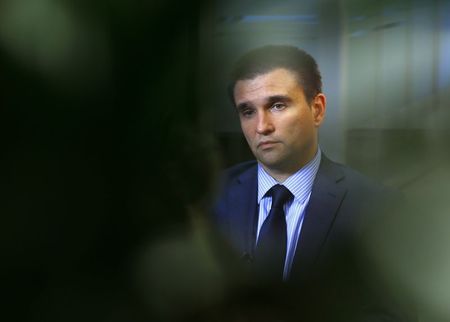By Alastair Macdonald
BRUSSELS (Reuters) - Ukraine warned the European Union on Wednesday not to accept pro-Russian rebels carving out a de facto state and said that unlike other "frozen conflicts" in the former Soviet Union it could destabilise all of Europe.
Foreign Minister Pavlo Klimkin, speaking to Reuters during a visit with EU and NATO officials in Brussels, urged Moscow to dissuade separatists from holding their own elections in the eastern regions of Donetsk and Luhansk next month. He said local people would do better to vote in local elections organised by Kiev in December.
"Fake elections" organised by leaders of self-styled, pro-Russian people's republics would, Klimkin said, reinforce the appearance that eastern Ukraine is becoming a long-term "frozen conflict" like Transdniestria or Abkhazia, Moscow-backed breakaway regions of former-Soviet Moldova and Georgia.
"A frozen conflict in Donetsk and Luhansk, let us not have any illusions, could not be stabilised as for example Transdniestria or Abkhazia ... It would bring us more instability, more detribalization, not only for the whole of Ukraine but for the whole of Europe," Klimkin said.
He insisted he was not saying so to "blackmail" western European states into stepping up actions, such as economic sanctions, against Russia, or to get NATO to increase non-military assistance to Kiev.
The European Union is due to review some of its sanctions against Russia next month.
Klimkin said people in eastern Ukraine had to "get rid of the terrorists" running the region, and he said Moscow should help defuse the conflict there, which has continued despite a ceasefire agreed in early September.
On Wednesday, the United Nations said that struggle was claiming about 10 lives a day among government troops, pro-Russian separatists and civilians.
ELECTIONS
Acknowledging that Kiev could not easily prevent people in the largely Russian-speaking east from holding their own vote on Nov. 2, he urged Moscow not to recognise that process and to back Kiev's offers of more autonomy for the regions.
"It's also about Russia saying extremely clearly that such elections are no option at all," Klimkin said. "Russia should discourage Donetsk and Luhansk from having these elections and try to put the process on the track to stabilisation."
Ukrainian President Petro Poroshenko, elected in May in a vote that many in the east ignored, has called a parliamentary election for Oct. 26. He hopes that can undercut accusations from Russian President Vladimir Putin that the Western-backed Kiev leadership, which took power after a popular uprising in February, lacks legitimacy and is hostile to ethnic Russians.
"We have to get on track the all-inclusive, all-Ukrainian political process in Donetsk and Luhansk," Klimkin said. "We are ready for more decentralisation."
The foreign minister, a 46-year-old career diplomat appointed in June, said meetings with EU officials and with new NATO secretary-general Jens Stoltenberg had confirmed further support for Ukraine, including NATO-brokered funding for efforts to strengthen Kiev's underfinanced armed forces.
He renewed appeals for Moscow not to disrupt Ukraine's efforts to move closer to the EU, and said Russia should see its own advantage in a closer relationship across the continent.
"We are not, so to speak, about to depart Russia, to make a kind of break, to establish a sort of wall between Russia and us," he said of Ukraine's main trading partner.

"Russia should be interested actually in stabilisation for the whole region and for the possibilities to link, to communicate effectively with Europe because Russian future without this communication is simply unimaginable."
(Additional reporting by Miranda Alexander-Webber)
